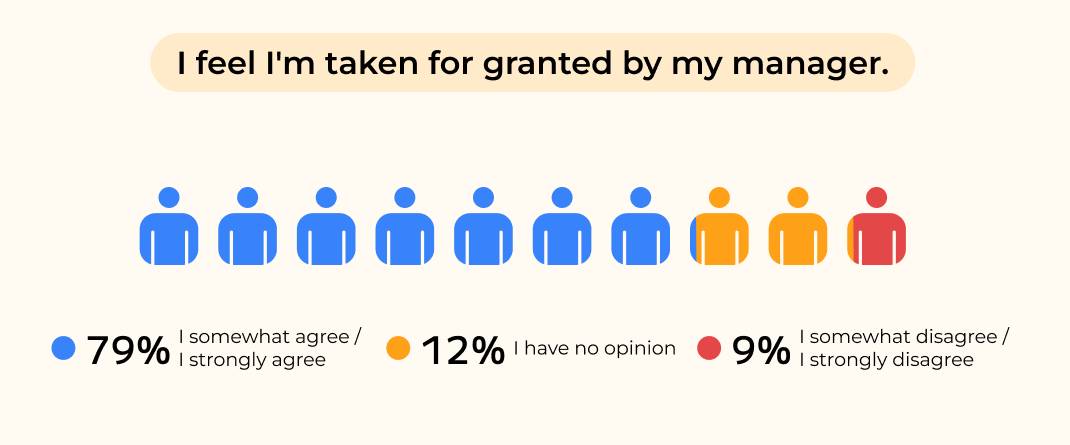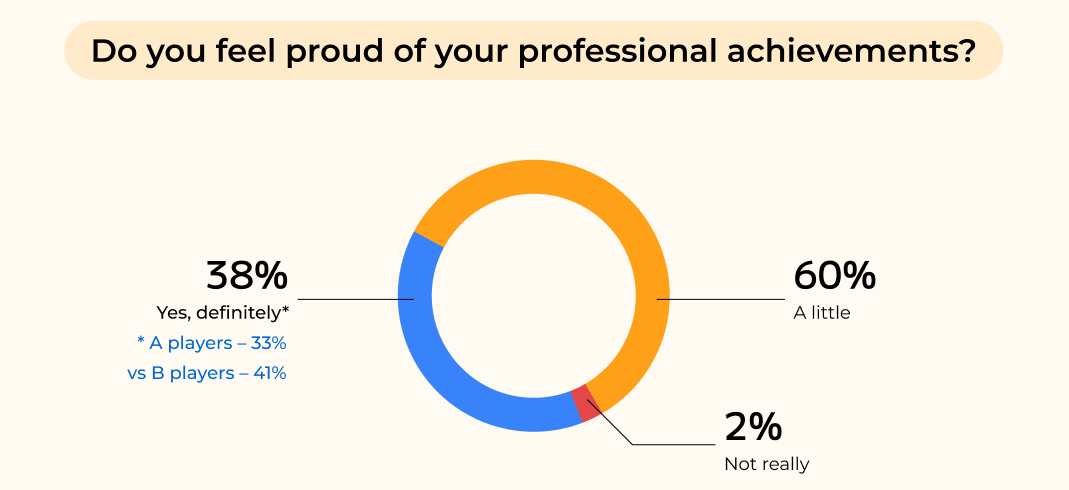Unveiling the Power of Employee Recognition
Create Your Resume NowThe modern workplace is a rapidly changing picture. With more and more forward-thinking companies adopting a human-centered approach, it's crucial to understand how employees feel about their professional life and what keeps them going at work. Do they know their value? Are they proud of themselves? And do they feel recognized for a job well done? Let’s find out.
On July 5, 2023, we surveyed over 1,000 U.S.-based workers to examine sentiments toward their professional life and the dynamics of different employee types. The study provided valuable insights into i.a. the role of receiving praise, perceived workplace strengths and weaknesses, and attitudes to making personal sacrifices for a successful career. Our findings are below!
The Role of Recognition at Work
We all want to be appreciated – in the workplace and beyond. Not a great secret to reveal here. Recognition gives employees a sense of accomplishment, making them more motivated, productive, and satisfied with their careers.
Unfortunately, almost 8 in 10 (79%) of respondents feel that they are taken for granted by their manager.

Additionally, one-third said they rarely or never receive praise from their manager. Even fewer, 25%, rarely or never receive praise from their colleagues.
The data below breaks it down more specifically.
How often do you receive praise from your colleagues?
- Often – 13%
- Sometimes – 62%
- Rarely – 21%
- Never – 4%
How often do you receive praise from your manager?
- Often – 16%
- Sometimes – 53%
- Rarely – 27%
- Never – 5%
Jacques Buffett, Career Expert at Zety, commented on the role of workplace recognition in light of the study conducted.
“Offering praise for a job well done can have a profoundly positive and motivating impact on employees, but judging by our data, many workers are not receiving enough praise in the workplace," said Buffett. “We shouldn’t underestimate the importance of giving genuine recognition for accomplishments. Whether you’re a manager or a colleague, through a small effort, your encouraging words can play a vital role in improving someone’s job satisfaction,” Buffett concluded.
Kind words cost nothing but have tangible benefits. The more valued the employees, the more positive the atmosphere in the company, which contributes to the organization's overall success.
Workplace Strengths & Weaknesses
Not being recognized enough seems to have a negative impact on employees’ assessment of their work as well. Roughly 4 in 10 (38%) of participants feel proud of their professional achievements.

The study participants were also asked to name their greatest workplace strengths. Each could choose up to three options. Their answers were the following:
- Self-discipline – 33%
- Creativity – 32%
- Leadership skills – 30%
- High ambition – 28%
- Reliability – 28%
- Communication skills – 28%
- Company loyalty – 24%
- Persistence – 20%
- Proactive attitude – 20%
- Adaptability to changing circumstances – 16%
On the other hand, when reflecting on their greatest workplace weaknesses, respondents named:
- Giving up easily – 33%
- Sensitivity to criticism – 30%
- Reluctance to take risks – 28%
- Lack of willingness to learn – 28%
- Poor leadership skills – 27%
- Impatience – 27%
- Poor adaptability skills – 24%
- Negative perfectionism – 22%
- Poor interpersonal skills – 21%
- Not standing up for myself – 15%
The identified areas could potentially be strengthened through praise from managers and colleagues. Still, at the same time, 65% of respondents claimed they would prefer to receive regular feedback, including improvement areas, over regular praise (35%).
Employers should take note. Employees – as the driving force behind a company's success – are the most precious workplace assets. Nurturing their value goes hand in hand with the sustained growth of the business. Win-win situation.
What Keeps Us Going At Work
Zety’s survey also examined what motivates U.S.-based employees to work. Respondents could choose up to two options they considered most important.
Work enjoyment (26%), financial reasons (20%), and personal ambition (20%) were chosen as the top motivational factors.
The full breakdown of the data on workplace motivation is presented below.
What motivates you to work?
- Work enjoyment – 26%
- Financial reasons – 20%
- Personal ambition – 20%
- Family reasons – 19%
- Promotion opportunities – 18%
- Having a positive atmosphere in the workplace – 15%
- Stability of employment – 15%
- Sense of job meaningfulness – 13%
- Emotional attachment to the company – 13%
- Desire to progress in my career – 13%
- Being recognized for my work – 11%
- Other – 2%
As you can see, surprisingly, only 11% of respondents chose getting recognition for their work as one of the most important ingredients of their workplace motivation. Still, the role of receiving praise is hard to overstate.
- Quantum Workplace’s 2023 Employee Engagement Trends Report on employee trends revealed that a lack of recognition is among the top 3 reasons people leave their jobs. And employees who believe they’re recognized are 2.7 times more likely to be highly engaged.
Let’s get back to Zety’s study. Here are some additional findings to mention:
- The vast majority of the respondents would go really far for a successful career. They would sacrifice their personal values (77%), mental health (77%), and even their romantic relationship/marriage (75%).
- 55% would choose doing meaningful work over earning a lot of money (45%).
- 72% would choose job satisfaction over job prestige (28%).
The discussed study provided valuable insights into how employees feel in today's workplace and what can help them achieve their full potential.
Research findings highlight how essential it should be for leaders and managers to prioritize recognizing their team members' contributions regularly. By following such practices, companies create a positive work environment, which – in the long run – leads to a loyal, high-performing workforce and, therefore, the greater success of the organization.
About Zety’s Editorial Process
This article has been reviewed by our editorial team to make sure it follows Zety's editorial guidelines. We’re committed to sharing our expertise and giving you trustworthy career advice tailored to your needs. High-quality content is what brings over 40 million readers to our site every year. But we don't stop there. Our team conducts original research to understand the job market better, and we pride ourselves on being quoted by top universities and prime media outlets from around the world.
